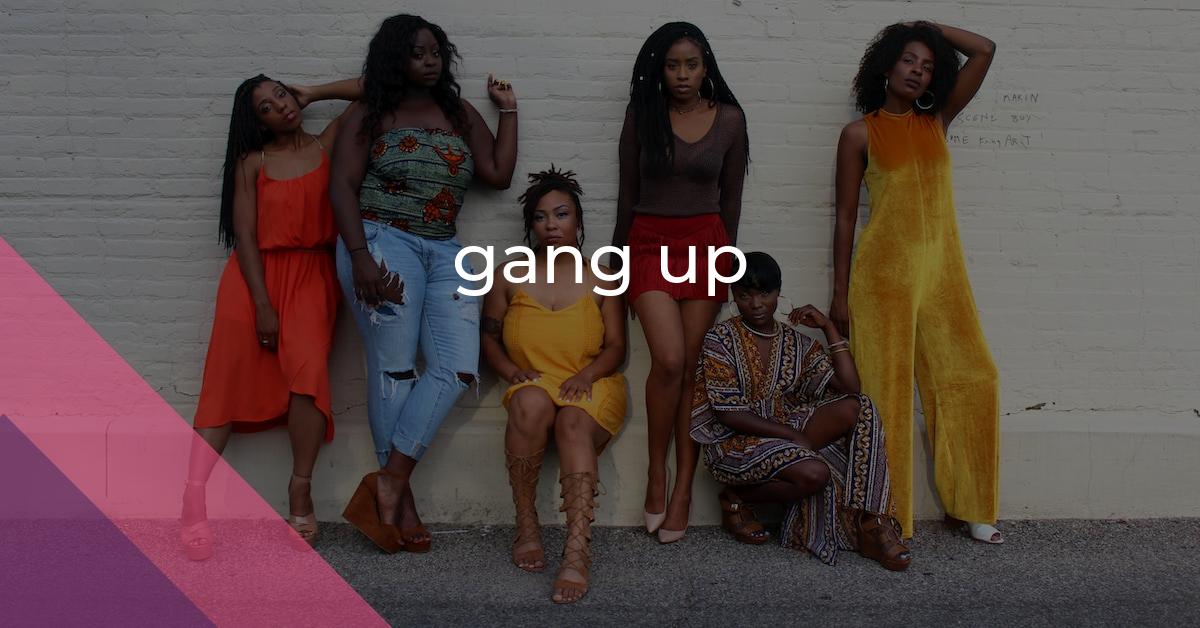gang up: Idiom Meaning and Origin
What does ‘gang up’ mean?
The idiom "gang up" means to join together as a group, often to confront or attack someone or something. It implies a sense of unified action and can have both negative and positive connotations depending on the context.

Idiom Explorer
The idiom "knit together" means to unite or bring people or things closer in a strong and cohesive way.
The idiom "join forces" means to unite or collaborate with someone or a group of people to achieve a common goal or objective.
The idiom "in chorus" means to do or say something together, simultaneously, or in unison as a group. It implies a shared agreement or unified response among individuals.
The idiom *hutch up* means to crowd together or squeeze into a small space. It is often used to describe a group of people or animals gathering closely together in a confined area.
The idiom "hold together" means to stay unified, despite challenges or difficulties, and not fall apart or disintegrate.
An idiom that means to gain momentum or build up force, often used in the context of a person or group gathering energy or enthusiasm for a task or goal.
The idiom "hang together" means to stay united and support each other, especially during challenging or difficult times.
The idiom "go together" means that two or more things are harmoniously compatible or commonly associated with each other.
The idiom "goon squad" refers to a group of aggressive and intimidating individuals who work together to enforce an agenda, often involving coercion or violence.
The Unifying Force
Gang up is an idiom that is commonly used in everyday language. It means a group of people coming together to act against a common target or objective.
The term "gang" dates back to the early 13th century and originally meant a group of people who worked together and shared a common interest or purpose. Over time, it evolved to refer to both positive and negative associations.
The idiom gang up can be traced back to the early 19th century and is believed to have originated in the United States. It has since become widely used in English-speaking countries.
Another notable fact about this idiom is that it can be used both literally and figuratively. In a literal sense, gang up refers to a physical act of individuals forming a group to confront someone or something. Figuratively, it represents a collective effort to combine resources, influence, or power to achieve a common goal or oppose an individual or group.
The idiom often implies a sense of imbalance or unfairness, as the collective group is typically seen as overpowering an individual or smaller group.
In the United States, gang up is frequently used in everyday conversations, literature, and media. It often appears in situations where a group of people is perceived to be working together against someone or something, and can be found in media reporting, political discussions, and even fictional narratives.
While the literal and figurative usage of gang up is well-documented, the idiom also carries a sense of ambiguity and open-endedness. It leaves room for interpretation and speculation, as it does not provide specific details about the nature or purpose of the group's actions.
Gang up is closely related to the idioms "gang up on," "band together," and "join forces."
Gang up on means to collectively confront or attack someone or something. It can carry a negative connotation of unfairness or ganging up against a weaker party.
Band together has a similar meaning to gang up, representing a group of people coming together to achieve a common goal or purpose. It emphasizes unity and collaboration.
Join forces refers to individuals or groups combining their resources, influence, or power to achieve a common objective. It highlights the idea of working together and pooling resources for greater impact.
These idioms are all related to the concept of a group of people coming together and taking action towards a common target or objective. They highlight the importance of collaboration, unity, and collective effort.
The idiom gang up is commonly used to describe a group of people coming together to act against a common target or objective. It can be traced back to the early 19th century and has since become widely used in English-speaking countries. The idiom can be used both literally and figuratively, and often carries a sense of imbalance or unfairness. It is closely related to idioms such as "gang up on," "band together," and "join forces," which all emphasize the concept of collective action and collaboration. Despite its clear and widely understood meaning, gang up also allows for interpretation and adaptability in different situations.
Example usage
Examples of how the idiom "gang up" can be used in a sentence:
- During the debate, the other candidates seemed to gang up on him, criticizing his policies from all sides.
- The kids often gang up on the new student, teasing and excluding them from activities.
- When my friends and I play soccer, we always gang up against the strongest player to make the game more challenging.
More "Collaboration" idioms



